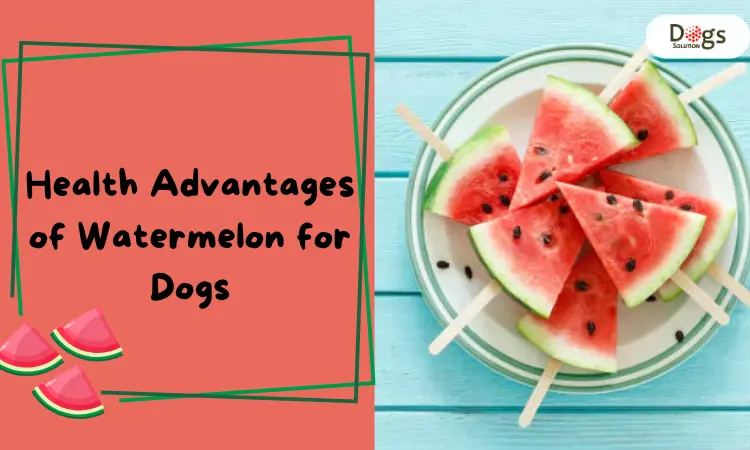Imagine yourself enjoying a juicy slice of watermelon on a sweltering summer day with the sun shining brilliantly and its reviving sweetness relieving your thirst; though, as your loyal furry friend looks at you with those begging puppy eyes, you can’t help but wonder, Can dogs eat watermelons ?
As we explore whether our four-legged pals may safely enjoy the vibrant world of watermelons, get ready, my fellow dog lovers, for an appealing journey. We’ll find the facts, leaving no stone unturned, including everything from potential hazards to nutritional advantages. Let’s find out; can my dog eat watermelon?
The Sweet Truth: Are Watermelons Safe for Dogs?
Our priority is ensuring our animal friends are safe when we share our favorite summer treat with them. So, let’s get to the meat of the matter: Is it safe for dogs to eat watermelon? Are there any possible hazards?

The good news is that dogs can typically eat watermelons, but responsible pet owners must know a few important factors. Watermelon seeds are the subject of one such misunderstanding. While it’s true that dogs can choke on watermelon seeds, the tiny, black seeds in seedless watermelons are usually safe.
Because they are soft, these seeds often pass through a dog’s digestive tract without problems. However, to be on the safe side, it’s still a good idea to remove the seeds or get seedless watermelon. Moderation is yet another important consideration. Start gently and in tiny quantities when introducing new food to a dog’s diet.
Different dogs have different sensitivities, and some may become unhappy when abruptly eating a fruit with a high water content, such as watermelon. If there are no unfavorable reactions after gradually introducing watermelon to your dog and seeing how they react, you can progressively increase the serving size.
Additionally, keep in mind that watermelon should never take the place of a balanced, nutrient-rich food designed especially for dogs. Although watermelon has certain health advantages, it should only be consumed as a treat or as an addition to normal meals.
It’s also critical to consider your dog’s specific health issues and nutritional needs. For instance, due to the natural sugar content of fruits, diabetic dogs may need to restrict their diet of fruits. Always check with your vet to be sure watermelon is appropriate for your dog’s specific requirements.
Watermelons: A Nutritional Bonanza for Dogs
Watermelons provide our canine companions with a nutritious feast in addition to their delectable taste. This fruit of the summer adds vital vitamins and minerals to your dog’s diet, giving it a healthy boost.
Including watermelons in your dog’s diet might provide them a nutritional boost and keep them content and healthy. Just keep in mind to offer them in moderation, as part of a healthy diet, and always speak with your doctor to ensure it complies with your dog’s dietary requirements.
So, cut up some watermelon and let your pet enjoy the nutritious wealth that this delicious fruit provides. First, watermelons are a great way to stay hydrated, especially in the scorching summer. These juicy treats, which are 90% water, may keep your dog hydrated, improving general health and reducing dehydration.
Watermelons are a great option for dogs concerned about their weight because they are low in calories and fiber. The fiber content facilitates A balanced digestive system, which also encourages healthy bowel motions and assists in digestion. Watermelons are also a guilt-free snack choice because they have few calories, so your dog may indulge without risking their weight.
Watermelons provide hydration, fiber, and an outstanding range of vitamins, including vitamins A and C. While vitamin C is a potent antioxidant, increasing your dog’s defenses against damaging free radicals, vitamin A promotes eye health and a robust immune system.
Health Advantages of Watermelon for Dogs:
This delicious fruit delivers a paw-some punch regarding the health advantages of watermelon for dogs. Eating watermelon may have a few positive outcomes for our animal pals.

Hydration and Electrolyte Balance:
Since watermelons contain 90% water, they are a great source of hydration for dogs. Proper hydration is essential to maintaining general health, supporting digestion, controlling body temperature, and enhancing organ function.
You can help your dog stay adequately hydrated by including watermelon in its food, especially during hot weather or after vigorous activity. Watermelons’ high water content supports optimum bodily function by preserving electrolyte balance.
Rich in Essential Vitamins and Minerals:
Watermelons contain vital vitamins and minerals that support your dog’s overall health. They are a fantastic source of vitamin A, which supports strong immunity, excellent vision, and development.
Another important ingredient in great watermelons, vitamin C, is a potent antioxidant to support collagen formation, the immune system, and cellular health. Potassium, another mineral found in watermelons, is necessary for supporting healthy nerve and muscle function.
Fiber for Digestive Health:
Watermelons have a lot of fiber, which is important for keeping the digestive system in excellent shape. Watermelons include fiber, which helps with digestion, regulates bowel motions and can help avoid constipation.
You may improve your dog’s overall digestive health and promote a healthy intestinal environment by feeding them watermelon.
Antioxidant Support:
Antioxidants like lycopene & beta-carotene are abundant in watermelons. By scavenging dangerous free radicals in the body, these antioxidants lessen oxidative stress and inflammation.
Dogs can benefit from the antioxidants’ preventive benefits, which can strengthen their immune system, encourage good aging, and aid in preventing some illnesses by eating watermelon.
Low in Calories and Fat:
Because they are a fruit with few calories and fat, watermelons are a great option for dogs trying to lose weight. Watermelon’s inherent sweetness may offer a delightful pleasure without significantly increasing a person’s calorie or fat intake.
It enables canines to indulge in a light and delectable snack while keeping a healthy weight or aiding in weight loss.
Watermelon Watchouts: When to Proceed with Caution?
With its cooling and juicy qualities, watermelon is a favorite summer treat for many. But what about our animal companions? Can dogs luxuriate in this fruit’s sweetness?

While watermelon may be a delightful and healthy treat for dogs occasionally, there are a few precautions to consider before giving it to your dog.
Balanced Dozes:
The most important thing to keep in mind is that moderation is critical. Watermelon is typically healthy for dogs in modest doses, but due to its high-water content and natural sugars, excessive ingestion might cause upset stomach or even diarrhea. As a result, it’s crucial to serve watermelon in moderation, especially in the beginning.
Serving method:
The serving manner is another important factor. Make sure the watermelon you give to your dog is seedless and rind-free. Watermelon seeds can be an intestinal obstruction or a choking danger when consumed in excessive numbers. Like humans, dogs may have digestive problems due to the rough rind’s difficulty digesting. Limit your giving to the watermelon’s flesh, and make sure it is diced into manageable portions for your pet to consume safely.
Focus on health conditions:
Additionally, being aware of any medical issues your dog may have is critical. Given its natural sugar content, watermelon should be avoided by diabetic dogs or those who need to watch their weight. It is advisable to contact your veterinarian to establish the proper portion size and frequency depending on your dog’s unique needs because the sugar in watermelon might induce a spike in blood sugar levels.
Remove the skin:
Last, it’s important to remember that while ripe watermelon flesh is typically healthy for dogs, other fruit components, such as the peel or rind, are not. If consumed, the hard outer peel may be difficult to digest and may result in gastrointestinal upset. Always peel the watermelon and ensure your dog can only access the flesh.
Conclusion: Can Dogs Eat Watermelons ?
In conclusion, dogs can occasionally enjoy the delicious sweetness of watermelon as a safe and tasty treat. However, it’s crucial to use caution and implement some safety measures. Your animal buddy may enjoy this delightful fruit risk-free if you provide seedless and rind-free watermelon in moderation.
For your dog’s general health, watching portion quantities and considering any unique medical concerns is crucial. By keeping these things in mind, you may give your dog a pleasant and refreshing summer treat while still being able to enjoy watermelon.
Recently, my dog tried broccoli, and he just loved it. if you want to know; Is Raw Broccoli Good for Dogs ? the answer is “YES”.
Can dogs eat watermelon rinds?
Dogs shouldn’t eat watermelon rinds, not at all. If consumed, the hard rind may be difficult to digest and may result in digestive problems.
How much watermelon can a dog eat?
Watermelon is safe & secure for dogs to eat in moderation. Consider your dog’s size, weight, and any underlying medical concerns when providing tiny, seedless pieces as an occasional treat.
Can dogs eat watermelon skin?
Dogs shouldn’t consume watermelon skin. Ingesting the rough skin may result in gastrointestinal upset since it might be difficult to digest.
Can dogs eat yellow watermelon?
Dogs can consume yellow watermelon. Dogs can eat yellow watermelon in moderation, just like regular red watermelon. But always remove and rind the seeds before giving them to your pet.
Can dogs eat seedless watermelon?
Dogs can consume seedless watermelons. Watermelon without seeds is okay for dogs to eat, but remove the skin and chop it into bite-sized pieces before giving it to them as a treat.
Can dogs eat watermelon white seeds?
Let’s find out; can dogs eat the white seeds in watermelon? Even while a few watermelon seeds won’t likely damage your dog, removing the white seeds first is advisable. Large amounts of seeds might cause digestive problems or intestinal obstruction.






